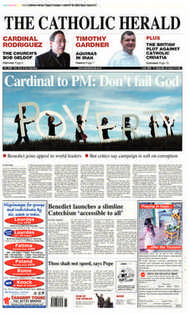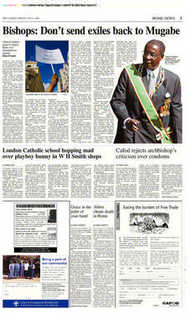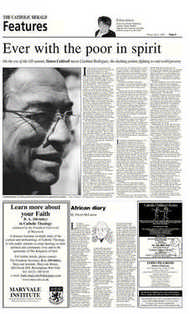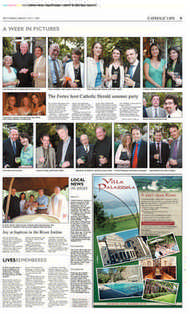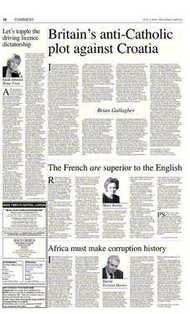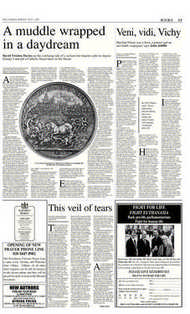Page 3, 1st July 2005
Page 3
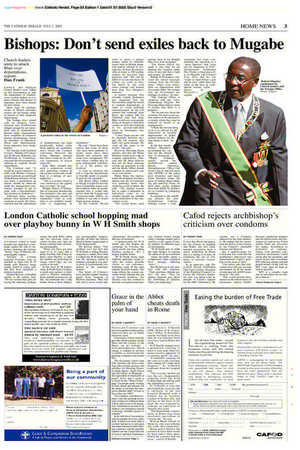
Report an error
Noticed an error on this page?If you've noticed an error in this article please click here to report it.
Tags
Share
Related articles
Bishops Send Message Of Support To Zimbabwean Catholic...
Asylum Proposals Criticised By Bishop
Mugabe Rages At ‘satanic’ Archbishop
Churches Demand Zimbabwe Sanctions
Africa
Bishops: Don’t send exiles back to Mugabe
Church leaders unite to attack Blair over deportations, reports Dan Frank
CATHOLIC and Anglican Church leaders have called on the Government to halt the repatriation of Zimbabwean asylum seekers as evidence mounts that dozens of deportees have been abused on their return.
More than 50 Zimbabweans in British detention centres are on hunger strike in protest at their proposed deportations.
The bishops have joined calls by Amnesty International and Zimbabwean refugee groups for an immediate end to repatriations. Human rights organisations have compiled an extensive dossier documenting claims by returnees of detention, abuse and interrogation. Some deportees have disappeared.
On Tuesday both Cardinal Cormac Murphy-O’Connor and Dr Rowan Williams, the Archbishop of Canterbury, criticised the Government for refusing to suspend forced repatriations.
The Cardinal said: “It would be a gross injustice, at odds with Britain’s humanitarian traditions, to send back Zimbabwean refugees. At the very least, a moratorium on returns should be observed while the international community attempts to get to grips with a fast-deteriorating situation in Zimbabwe.”
Although three asylum seekers were deported at the weekend in secret, the Times reported that the repatriation
of Zimbabweans has been unofficially halted while fresh appeals are examined, news which the Cardinal welcomed. However, the Prime Minister insisted that there would be no official suspension of forced removals.
Tony Blair claimed that such a suspension would only undermine reforms of the asylum system and would lead to a deluge of new applicants.
“This is a system which is very sensitive to the signals that you send,” he said.
Bishop Patrick O’Donoghue of Lancaster attacked the Government’s line and said that deportations should be suspended “until as such time as we establish clearly what is happening in Zimbabwe”.
He said: “There have been reports that some of those who have been deported in recent times have been abused and tortured, and some have disappeared. We don’t know whether they’ve gone underground voluntarily or if the police are involved.
“I want to reinforce the call to stop the deportations or forcible return of people, at least for the moment.” The Home Office looked as though it might be moving from its hard-line stance over the weekend when an insider claimed that it would take advice from the Foreign and Commonwealth Office on whether it was safe to return failed asylum seekers.
As The Catholic Herald
went to press a protest hunger strike by Zimbabweans held in British detention centres entered its seventh day. At least 40 and possibly as many as 100 asylum seekers are involved. One protestor said: “We will be killed if we are sent back. Of course we want to live, but better to die with some courage and honour here than face Mugabe’s torturers.” A former minister who recently visited Zimbabwe has suggested that the Government might be forced to suspend deportations in order to avoid potential embarrassment at the G8 summit this weekend. Kate Hoey, the Labour MP for Vauxhall, said that Tony Blair would not want people dying of hunger in detention centres to form the backdrop to his poverty-reduction drive at Gleneagles this weekend.
“I don’t think anyone will be deported between now and the G8 summit. But that’s not good enough. We want all the cases to be frozen,” she said.
However, Downing Street insiders said that the Prime Minister would resist calls to suspend deportations. They said that Mr Blair believes that not all those claiming asylum are genuinely at risk and the Home Office should continue to assess each case on its own merits.
Hilary Benn, the international development secretary, denied that the Government was returning those who might be at risk of abuse. He said: “The asylum system has to make a judgment in individual cases as to whether people are entitled to the protection of the convention or not.
“We would never send anyone back if we thought their lives were in danger.
“The Home Office has made it very clear we are keeping the situation under close review and that is right and proper,” he added.
Bishop O’Donoghue criticised the mixed messages coming from the Government. “There were restrictions on deportations until November 2004. We wonder why the Government has changed its policy,” he said.
“The Foreign Office is speaking with one voice, condemning Mugabe. But Downing Street doesn’t seem to realise that there is a problem.
“We are nervous about the situation. We don’t want asylum seekers to be returned to a country where they may be tortured or forced to go underground.
“I think the obvious thing to do is to call out for the suspension of forcible deportations of failed asylum seekers, for the time being at least,” he said.
In the last month Robert Mugabe’s government has carried out the demolition of thousands of “illegal” buildings, mainly around the Zimbabwean capital, Harare. Operation Murambatsvina (“Drive Out Trash”) has to date left more than 250,000 of the urban poor homeless and many more destitute under the guise of halting illegal building and reducing crime. At least three young children have been killed by bulldozers or crushed by collapsing buildings.
In response to the unfolding disaster the nine Zimbabwean Catholic bishops issued a joint
statement last week condemning the operation as a “gross injustice” that “cries out for vengeance to God”. Zimbabwean Archbishop Pius Ncube, a long-time critic of Mugabe, told Channel Four News that he was “ready to stand before a gun and be shot” rather than stay silent in the face of widespread human rights
abuses by Mugabe’s regime.
blog comments powered by Disqus


